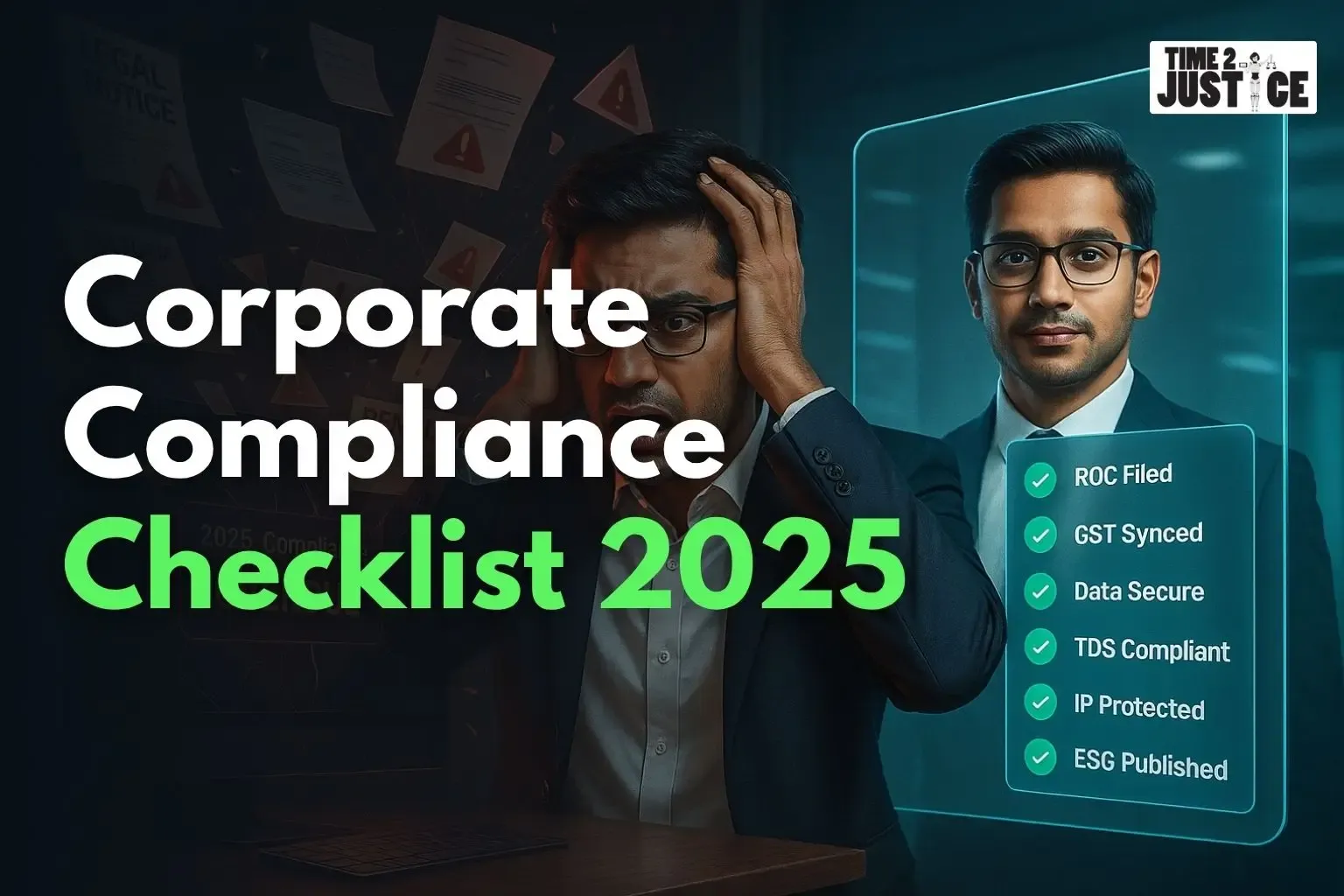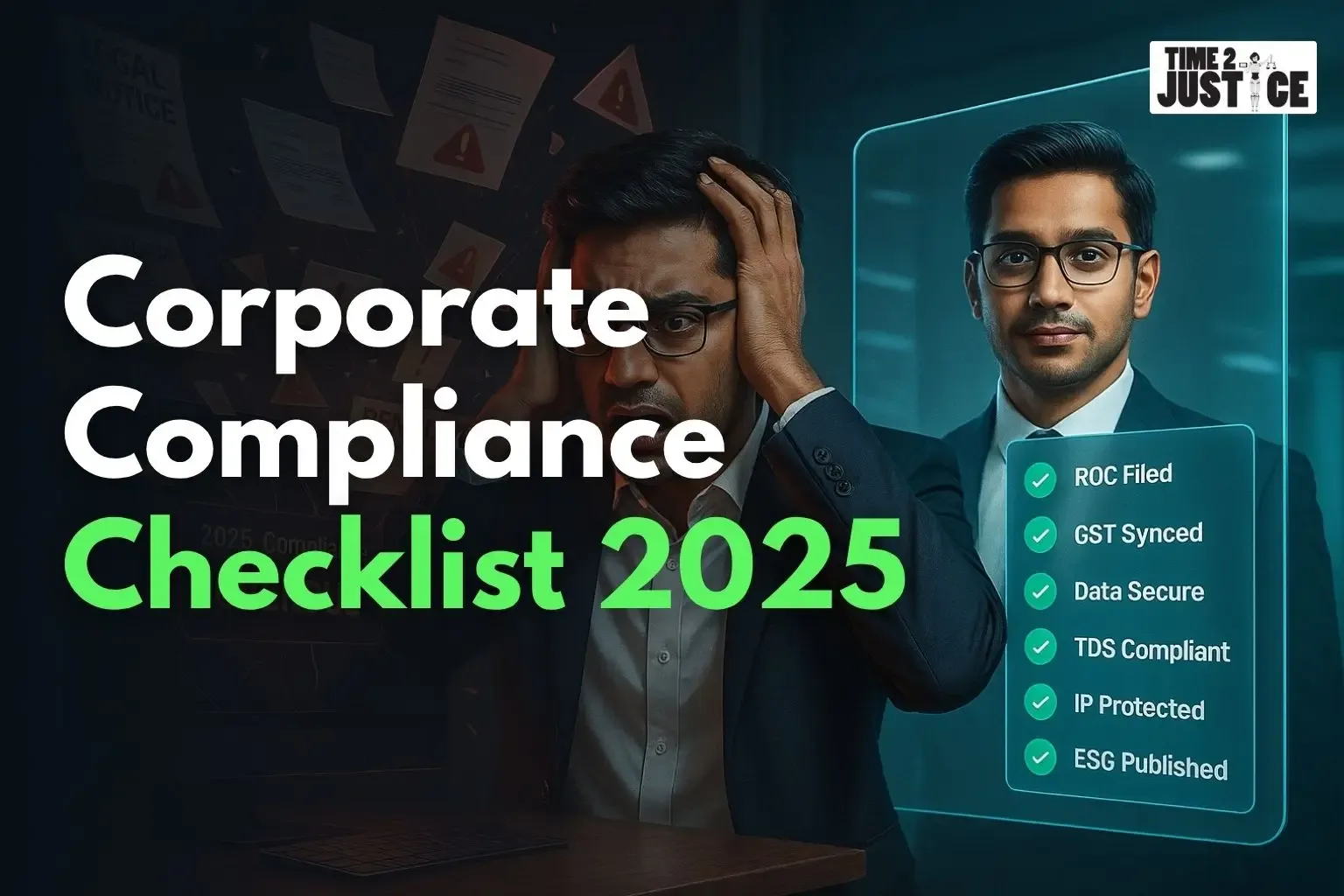Corporate Compliance Checklist in 2025
June 23, 2025


Introduction: Why 2025 Is a Crucial Year for Corporate Compliance in India
As India continues to emerge as a global economic hub, regulatory oversight has tightened across industries. Whether you're a startup founder, SME owner, or corporate executive, corporate compliance in India in 2025 is no longer optional it's critical for credibility, growth, and legal safety.
Failing to meet statutory obligations can lead to financial penalties, deregistration, loss of business licenses, and reputational damage. To help businesses stay ahead, we've created a comprehensive Corporate Compliance Checklist for 2025, tailored to Indian laws and updated with the latest reforms.
Corporate Compliance India 2025: Your Ultimate Checklist
1. Company Law Updates & ROC Filings (MCA Compliance)
Under the Companies Act, 2013, every registered company must file essential reports with the Registrar of Companies (ROC) to maintain good standing:
- Annual Return (Form MGT-7): Summarizes the company’s shareholding structure, financials, and compliance status.
- Financial Statements (Form AOC-4): Must be filed within 30 days of the AGM; includes the balance sheet, P&L, and board report.
- Director KYC (Form DIR-3 KYC): Annual KYC for all directors with a DIN, failure results in deactivation.
- Auditor Appointment/Resignation (Form ADT-1/ADT-3): Mandatory within 15 days of the AGM or auditor change.
- Board Resolutions (Form MGT-14): For select resolutions like change in company name, borrowing powers, etc.
Updates for 2025: The MCA V3 portal simplifies e-filing with improved user experience and AI-assisted form validation. E-adjudication mechanisms now automate penalty imposition for late or incorrect filings.
Action Tip: Maintain a digital compliance calendar to track statutory deadlines. Non-compliance with ROC filings can lead to cumulative penalties and director disqualification.
2. Goods & Services Tax (GST) Compliance
GST compliance ensures uninterrupted operations and tax credit claims:
- GSTR-1: Monthly or quarterly details of outward supplies (sales).
- GSTR-3B: Monthly summary return including ITC and tax payment.
- GSTR-9: Annual return reconciling monthly/quarterly data.
- ITC Reconciliation: Match purchase records with GSTR-2B to claim input credit.
Updates for 2025:
- E-invoicing is now mandatory for businesses with turnover over ₹5 crore.
- AI-powered scrutiny by GSTN flags inconsistencies in returns.
- Geo-coding of premises required for new registrations and renewals.
Action Tip: Use tools like ClearTax, Zoho Books, or TallyPrime to automate reconciliations and avoid ITC mismatches.
3. Income Tax & TDS Compliance
Accurate tax reporting under the Income Tax Act, 1961 is essential for startups and companies:
- ITR-1 to ITR-7: Choose the right form based on business type (proprietorship, partnership, company, trust).
- TDS Returns (24Q, 26Q, etc.): Quarterly filings for salary and non-salary deductions.
- Advance Tax Payments: Due quarterly for businesses with tax liability over ₹10,000 annually.
Updates for 2025:
- Startups face enhanced scrutiny on TDS compliance and ESOP taxation.
- PAN-Aadhaar link failure or under-reporting may trigger AI-generated notices.
- Presumptive taxation slabs revised for professionals and businesses.
Action Tip: Use a certified tax advisor or tools like Quicko to maintain digital books and plan tax liabilities.
4. ESI, EPF & Labour Law Compliance
Employers must comply with labor regulations to ensure employee welfare:
- EPF & ESI: Monthly contributions via the EPFO and ESIC portals.
- Professional Tax & LWF: Based on state laws; paid monthly or quarterly.
- Shops & Establishments Registration: Must be renewed as per state timelines.
- Wages, Bonus & Gratuity Acts: Minimum wages, timely salary, and benefits must be honored.
Updates for 2025: India's four new Labour Codes will consolidate 29 laws into a simplified structure:
- Code on Wages
- Code on Social Security
- Industrial Relations Code
- OSH & Working Conditions Code
Action Tip: Use HRMS tools like Keka or GreytHR to automate employee compliance and maintain transparent records.
5. Data Protection & IT Act Compliance
With the Digital Personal Data Protection Act (DPDP), 2023 in full force:
- Privacy Policy: Must include data collection, usage, and storage protocols.
- Explicit Consent: Required before collecting or processing user data.
- Cybersecurity: Use SSL, firewalls, backups, and ISO 27001 compliance.
- Data Protection Officer (DPO): Mandatory for entities with large data sets.
Action Tip: Use legal audit tools to review your data handling practices. Small businesses are equally liable under DPDP.
6. Intellectual Property Rights (IPR) Protection
Safeguard your business assets by registering:
- Trademarks: Brand names, logos, product identifiers (e.g., TM under Class 35 for B2B, Class 42 for software).
- Copyrights: Software, creative content, UI/UX designs.
- Patents: Innovations and technical processes.
Updates for 2025: India has enhanced integration with WIPO, easing Madrid Protocol filings and PCT applications.
Action Tip: Begin trademark and IP protection at the prototype stage to avoid infringement issues.
7. Contractual & Legal Documentation
To avoid operational and legal disputes, businesses must implement:
- Client & Vendor Agreements: Include scope, pricing, IP rights, and dispute resolution.
- Employment Contracts: Must comply with labor law and specify terms of employment.
- NDAs & SLAs: Protect sensitive information and service expectations.
Action Tip: Use e-signature platforms like Zoho Sign or DocuSign for secure documentation trails.
8. Sustainability & ESG Disclosures
Environmental, Social & Governance (ESG) criteria are crucial even for MSMEs:
- Environment: Energy, water use, emissions.
- Social: Workplace diversity, CSR, skilling.
- Governance: Transparent decision-making and reporting.
Updates for 2025: SEBI requires top 250 listed companies to assess ESG metrics across supply chains. B2B clients now prefer ESG-compliant partners.
Action Tip: Publish basic ESG reports and highlight initiatives like solar power, CSR donations, or inclusive hiring.
Why Compliance Is the New Competitive Advantage
- B2B Brands: Regulatory compliance boosts your credibility in RFPs and investor decks.
- B2C Brands: Builds trust and improves customer retention.
Startups that embed compliance from day one scale faster and avoid regulatory roadblocks.
Tools & Partners for Hassle-Free Compliance in 2025
- Legal Services: SushilChoudhary.com, VakilSearch, IndiaFilings
- Accounting Tools: TallyPrime, QuickBooks, Zoho Books
- HRMS Platforms: Keka, RazorpayX Payroll, GreytHR
- Cybersecurity & Audits: Seqrite, McAfee, ISO 27001-certified vendors
Final Word: Be Compliance-Ready, Not Reactionary
Compliance is no longer just about rules. It's about readiness, growth, and brand trust. In 2025, regulatory awareness is your superpower.
Need Help Getting Compliant?
At Time2Justice.ai, we provide:
- End-to-End Corporate Compliance Support
- MCA & ROC Filings
- GST & Tax Return Management
- IPR, Contracts, and Labour Law Guidance
Contact us today and stay 100% legally protected in 2025 and beyond.
Time2Justice.ai is a collective of legal and technology enthusiasts publishing on the integration of AI in the legal field. We offer insights into the evolving world of AI legal advisors and its implications for practice and access to justice. Our articles serve both budding legal-tech aficionados and seasoned law professionals. We shed light on trends shaping legal services, debate ethical considerations, and navigate the tech that's redefining the legal landscape. Time2Justice.ai is also a hub for learning, offering courses on AI application in law.



